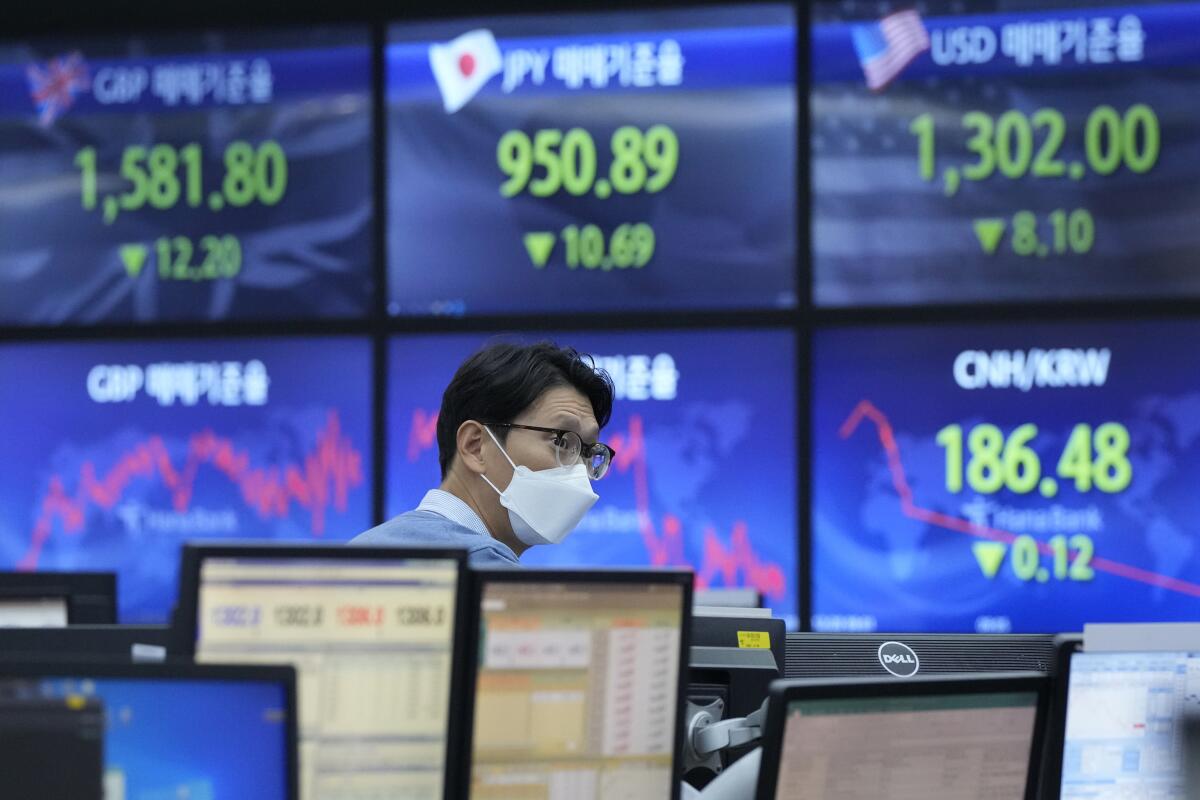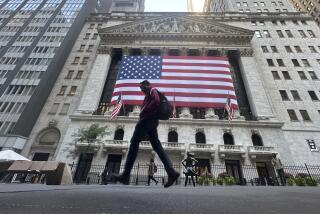Stocks rise, bond yields jump after Japan surprises markets

- Share via
Stocks closed modestly higher on Wall Street, while bond markets around the world feel pain Tuesday after a surprise move from Japan’s central bank cranked up the pressure on an already slowing global economy.
The Standard & Poor’s 500 index rose 0.1% after flipping between small losses and gains in the early going. The Dow Jones industrial average rose 0.3% and the Nasdaq composite barely budged, closing less than 0.1% higher. Small company stocks outdid the broader market, lifting the Russell 2000 index 0.5% higher.
The muted gains were enough to end a four-day losing streak for the major indexes.
The biggest action was in the bond market, where yields pushed higher after Japan, one of the world’s last bastions of super-low and economy-aiding interest rates, made moves that could allow rates to climb more than otherwise.
The Bank of Japan said Tuesday it still wants the yield on 10-year Japanese government bonds to remain at roughly zero, but it also said it would allow the yield to move up to 0.50% instead of the 0.25% cap it had held previously. What made Tokyo’s unexpected move a particular jolt was how much resistance it has shown so far in joining the global campaign to raise rates in order to undercut high inflation.
“BoJ’s surprise move allowed it to take a small step away from the extreme dovish side of the monetary policy spectrum, where it had stood alone all year among major central banks,” Jennifer Lee of BMO Economics wrote in a note to clients. “It is not joining the rate-hikers out there, but it is now a tad closer.”
Higher yields make borrowing more expensive, which slows the economy while also pushing down on prices for stocks and other investments. Other central banks around the world, particularly in the United States and Europe, have been raising rates at such an explosive clip that a growing number of economists and investors expect a recession to hit in 2023. Both the Federal Reserve and the European Central Bank have pledged to keep raising rates into next year to be sure inflation is brought under control.
Aftershocks from the Bank of Japan’s move Tuesday rippled through bond and currency markets around the world.
In the U.S., the yield on the 10-year Treasury rose to 3.68% from 3.59% late Monday. That yield helps set rates for mortgages and other economy-setting loans, which has already meant particular pain for the U.S. housing market.
A report on Tuesday showed U.S. home builders broke ground on fewer homes for a third straight month in November. The number of building permits, meanwhile, fell to its lowest level since June 2020, when the pandemic froze the economy.
The two-year U.S. Treasury yield, which tends to more closely track expectations for action from the Federal Reserve, was more reserved. It held steady at 4.26%.
In the foreign exchange market, Tokyo’s surprise move sent the value of the Japanese yen climbing against the dollar, which gave back some of its huge gains over the last year. The dollar fell to 131.50 Japanese yen, down 4% from a day earlier.
Mauricio Umansky, a Real Housewives of Beverly Hills regular and star of a new Netflix show, is accused of self-dealing in the $70-million sale of a spectacular Malibu estate seized from the vice president of Equatorial Guinea. He denies any wrongdoing.
Also, the Nikkei 225 index of Japanese stocks fell 2.5%.
Stocks worldwide have been under pressure the entire year on worries about high inflation, higher interest rates and a weakening economy.
“Markets continue to play the back and forth between inflation and concerns about Fed policy and growth,” said Zachary Hill, head of portfolio management at Horizon Investments.
Investors have been trying to push markets higher every time it seems that inflation is easing, and every time they “run into the simple fact that the Fed needs to tighten financial conditions to slow down the economy,” Hill said.
In Shanghai, stocks lost 1.1% after the World Bank cut its forecast for China’s economic growth this year to 2.7% from its June outlook of 4.3%. The bank cited repeated shutdowns of major cities to fight COVID-19 outbreaks. China now is relaxing some of its COVID restrictions, but worries are rising that resulting breakouts of the virus could inflict more hits on the world’s second-largest economy.
European markets ended mixed.
On Wall Street, the Bank of Japan’s move had less of an effect on stocks.
“It was a surprise, a very unexpected move, but on its own it’s probably not enough to really be a risk-off event for markets,” said Ross Mayfield, investment strategist at Baird.
The S&P 500 rose 3.96 points to 3,821.62. The Dow added 92.20 points to close at 32,849.74. The Nasdaq rose 1.08 points to 10,547.11. The Russell 2000 picked up 9.44 points to 1,748.02.
Energy sector stocks led the S&P 500′s gains as the price of U.S. oil gained 1.2%. Halliburton climbed 3.8%, and Schlumberger rose 3.9%.
Communications, technology and bank stocks also rose. Facebook parent Meta Platforms gained 2.3%, Adobe rose 2.9% and Charles Schwab added 1.7%. Tesla was the S&P 500′s biggest decliner, sliding 8.1%.
AP business writers Joe McDonald and Matt Ott contributed to this report.
More to Read
Inside the business of entertainment
The Wide Shot brings you news, analysis and insights on everything from streaming wars to production — and what it all means for the future.
You may occasionally receive promotional content from the Los Angeles Times.











